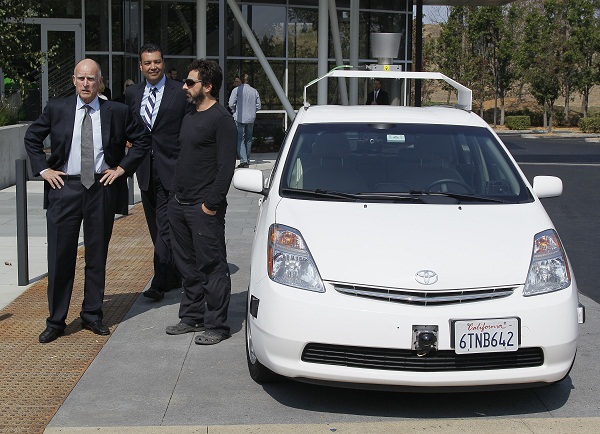California governor signs driverless cars bill

From left, California Gov. Edmund G Brown Jr., state Senator Alex Padilla and Google co-founder Sergey Brin stand by a driverless car they arrived in at Google headquarters in Mountain View, California, Tuesday, September 25, 2012. Brown visited Google to sign legislation for driverless cars. The legislation will open the way for driverless cars in the state. Google, which has been developing autonomous car technology and lobbying for the legislation has a fleet of driverless cars that has logged more than 300,000 miles (482,780 kilometers) of self-driving on California roads. AP/Eric Risberg
MOUNTAIN VIEW, California — Gov. Jerry Brown rode to Google headquarters in a self-driving Toyota Prius before signing legislation Tuesday that will pave the way for driverless cars in California.
The bill by Democratic Sen. Alex Padilla will establish safety and performance regulations to test and operate autonomous vehicles on state roads and highways.
“Today we’re looking at science fiction becoming tomorrow’s reality — the self-driving car,” Brown said. “Anyone who gets inside a car and finds out the car is driving will be a little skittish, but they’ll get over it.”
Google has been developing autonomous car technology and lobbying for the regulations. The company’s fleet of a dozen computer-controlled vehicles has logged more than 300,000 miles (483,000 kilometers) of self-driving without an accident, according to Google.
“I think the self-driving car can really dramatically improve the quality of life for everyone,” Google co-founder Sergey Brin said.
Autonomous cars can make roads safer, free commuters from the drudgery of driving, reduce congestion and provide transport to people who can’t drive themselves, such as the blind, disabled, elderly and intoxicated, Brin said.
“I expect that self-driving cars will be far safer than human-driven cars,” Brin said.
Brin predicted that autonomous vehicles will be commercially available within a decade. He said Google has no plans to produce its own cars, but instead plans to partner with the automobile industry to develop autonomous vehicles.
The Alliance of Automobile Manufacturers expressed concern that California is moving too quickly to embrace self-driving cars and needs to first sort out liability issues.
“Unfortunately this legislation lacks any provision protecting an automaker whose car is converted to an autonomous operation vehicle without the consent or even knowledge of that auto manufacturer,” the trade group said in a statement.
Autonomous cars use computers, sensors and other technology to operate independently, but a human driver can override the autopilot function and take control of the vehicle at any time.
With smartphone-wielding drivers more distracted than ever, backers say robotic vehicles have the potential to significantly reduce collisions and traffic fatalities, noting that nearly all car accidents are a result of human error.
The legislation requires the California Department of Motor Vehicles to draft regulations for autonomous vehicles by Jan. 1, 2015. Currently, state law doesn’t mention self-driving cars because the technology is so new.
The regulations would allow vehicles to operate autonomously, but a licensed driver would still need to sit behind the wheel to serve as a backup operator in case of emergency.
The legislation also is aimed at keeping California at the forefront of the autonomous car industry since Stanford University and Silicon Valley companies have been working on the technology for years.
In February, Nevada became the first U.S. state to approve regulations spelling out requirements for companies to test driverless cars on that state’s roads.
Carmakers such as Audi AG, BMW AG, Ford Motor Co. and Volvo have been working on autonomous car technology for years.
In recent years, automakers also have been introducing autonomous functions such as self-parking, lane departure warnings and adaptive cruise-control, which allows vehicles to automatically accelerate and decelerate with the flow of traffic.
Outside a cafe in Mountain View, California, customers said they looked forward to a day when their cars could drive themselves, as long as they could do it safely.
“It would make our streets safer,” said Barrett Howard, 33, an auto technician. “We wouldn’t have to worry about people texting or getting sidetracked. The computer will take over, and it will make life easier.”














